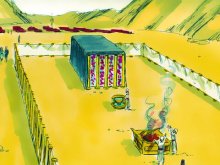The working age of Levites
By Mark Morgan | Jeremiah

What is the right age to start our life’s most important work? Some people begin to excel in their chosen profession at a very early age (for example, Mozart began composing at four or five years of age), while others shine much later (Oscar Swahn won his first Olympic gold medal at the age of 60). The Levites helped with the worship of God – who has killed people for flouting his rules of worship. For everyone’s good, the job had to be learned thoroughly. So what was the working age of Levites?
We still have rules today about the age at which one can start or stop work, and the same was true for priests and Levites in Israel.
After Israel left the land of Egypt, they counted the men who were 20 years old or older; those who were considered old enough to fight in the army of Israel. However, the Levites were counted separately, and they were only counted between the ages of 30 and 50 (Numbers 4:46-47). Their work as priests or Levites began when they reached 30 and ended at the age of 50.
Jeremiah the prophet was also a priest.
The age range over which Levites could work is specified for the Kohathites (Numbers 4:2-3, 34-35), and thus for priests who were descended from Kohath (1 Chronicles 6:1-3; 23:12-13).
The same age range was also specified for Levites descended from Merari (Numbers 4:29-30, 42-43) and Gershon (Numbers 4:38-39).
Interestingly, however, there are also two other starting ages mentioned.
The application of this age is is not completely clear. I think it is most likely to mean that Levites started learning their work at 25 and were then permitted to work unsupervised at 30.
David said that priests and Levites could begin work earlier because they no longer needed to carry the holy items as they had in the wilderness (1 Chronicles 23:25-26). Once again, I think this is most likely to refer to the age at which Levites began to learn their work. If you like, the age at which they started their apprenticeship. I can’t prove this, but the age of 30 is still mentioned in 1 Chronicles 23:3 as the starting age for counting the Levites, so I think the apprenticeship idea is the most likely explanation. This would have extended their working life to 30 years.
The working age of Levites is important in the life of Jeremiah. In the series “Terror on Every Side!”, I have assumed that Jeremiah was 17 years old in the 13th year of Josiah and therefore began to work as a priest at the age of 30 in the 26th year of Josiah. On this basis, he would have stopped working as a priest at 50 in the fourth year of Zedekiah.
Based on the little information we have about Hilkiah’s sons, I have assumed that Azariah (the next High Priest) was the oldest son, Gemariah the next and Jeremiah the youngest.
Jeremiah’s older brother Gemariah I have said to be 7 years older than Jeremiah, and so he would have reached the age of 50 in the 8th year of Jehoiakim.
Azariah, according to my assumptions, was Jeremiah’s oldest brother and became the High Priest. I have assumed him to be 10 years older than Jeremiah, but as High Priest he would have continued to serve in that capacity until his death, just as Aaron did.
These age limits would have had a very practical effect on the lives of individual priests, just as fixed retirement ages do in our own times.
Sometimes we can feel that the Law of Moses specified every possible detail of life. In reality, it is only a brief set of laws. What should happen in many specific situations is not addressed. For example:
30 years old was an important age in the life of some other people too. See an earlier Bible Tales article: Did King Josiah make a difference?.
You may be interested in an article on Chabad.org, “Who were the Levites?”